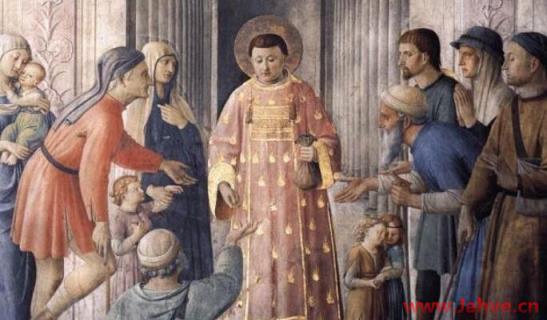 原文|Bishop Barron翻译|Carrie2017-10-18
原文|Bishop Barron翻译|Carrie2017-10-18 朋友们,今天的福音体现了耶稣对信徒的要求以及如何实践。我们是传教教会。主派遣我们去传播祂的圣言、为祂工作。我们不应自私自利地把基督福音据为己有,而是应该把它像种子一样撒播开去。对于传道工作来说,祈祷并非可有可无、锦上添花的,而是教会工作的命脉。没有祈祷,我们将一事无成;没有祈祷,一切传道工作都寸步难行。我们要时时刻刻祈祷、祈祷、祈祷。福音传播要有效的先决条件是贫穷和简单的生活。安东尼、本笃、金口、方济各、嘉勒、道明、依纳爵、德兰修女,等等等等。最有效的福传者都仰仗天主的保佑并消除物欲。神职人员进入一座城时首先要做的是什么?“治愈病患。”基督是救主,治愈我们的身体和灵魂。教会的第二个重任是宣扬“天国临近”。教会是通报、宣讲、传道的有机体。Friends, our Gospel shows us what Jesus wants his followers to be doing and how they ought do it. We are a missionary church. We are sent by the Lord to spread his word and do his work. The Gospel is just not something that we are meant to cling to for our own benefit; it is seed that we are meant to give away.Prayer is not incidental to ministry. It is not decorative. It is the lifeblood of the Church's efforts. Without it, nothing will succeed; without it, no ministers will come forward. At all times pray, pray, pray.Poverty and simplicity of life are prerequisites to the effective proclamation of the Gospel. Anthony, Benedict, Chrysostom, Francis and Clare, Dominic, Ignatius, Mother Teresa—across the board, the most effective proclaimers of the Gospel are those who rely on the providence of God and strip themselves of worldliness.What is the first thing that the minister should do upon entering a city? "Cure the sick there." Christ is Soter, healer of both body and spirit. The second great task of the Church is to proclaim that "the reign of God is at hand." The Church is an announcing, proclaiming, evangelizing organism.2017-10-17
朋友们,今天的福音体现了耶稣对信徒的要求以及如何实践。我们是传教教会。主派遣我们去传播祂的圣言、为祂工作。我们不应自私自利地把基督福音据为己有,而是应该把它像种子一样撒播开去。对于传道工作来说,祈祷并非可有可无、锦上添花的,而是教会工作的命脉。没有祈祷,我们将一事无成;没有祈祷,一切传道工作都寸步难行。我们要时时刻刻祈祷、祈祷、祈祷。福音传播要有效的先决条件是贫穷和简单的生活。安东尼、本笃、金口、方济各、嘉勒、道明、依纳爵、德兰修女,等等等等。最有效的福传者都仰仗天主的保佑并消除物欲。神职人员进入一座城时首先要做的是什么?“治愈病患。”基督是救主,治愈我们的身体和灵魂。教会的第二个重任是宣扬“天国临近”。教会是通报、宣讲、传道的有机体。Friends, our Gospel shows us what Jesus wants his followers to be doing and how they ought do it. We are a missionary church. We are sent by the Lord to spread his word and do his work. The Gospel is just not something that we are meant to cling to for our own benefit; it is seed that we are meant to give away.Prayer is not incidental to ministry. It is not decorative. It is the lifeblood of the Church's efforts. Without it, nothing will succeed; without it, no ministers will come forward. At all times pray, pray, pray.Poverty and simplicity of life are prerequisites to the effective proclamation of the Gospel. Anthony, Benedict, Chrysostom, Francis and Clare, Dominic, Ignatius, Mother Teresa—across the board, the most effective proclaimers of the Gospel are those who rely on the providence of God and strip themselves of worldliness.What is the first thing that the minister should do upon entering a city? "Cure the sick there." Christ is Soter, healer of both body and spirit. The second great task of the Church is to proclaim that "the reign of God is at hand." The Church is an announcing, proclaiming, evangelizing organism.2017-10-17 朋友们,耶稣把今天的福音总结为施舍是圣洁的关键。我曾经跟你们引用过众多圣人和教宗的一些关于施舍的激动人心的语录:教宗利奥十三世说:“一旦必要的和正当的生活需求得到满足,你口袋里的余钱都属于贫民的.” 圣金口若望说:“衣柜有两件衬衫的人,一件是他自己的,另一件则属于那个没有衬衫可穿的人。”这些想法的最深根源是圣经中的先知,他们从不间断地痛骂着那些漠视贫民的人。先知们教诲我们同情心是圣经道德的关键,即有难同当、感同身受。我们说的并非抽象的亚里士多德道德哲学,而是一种发自肺腑的体验。这正是为何两大诫命是如此紧紧相扣:“你应全心,全灵,全意,爱上主你的天主…你应当爱近人,如你自己。” 在爱着天主的过程中,你会与天主感同身受,而天主对贫民和被压迫者富有同情之心。对于恪守圣经的人,所需的理由无非就是上述的两大诫命。Friends, Jesus concludes today's Gospel by prescribing giving alms as a key to holiness. I've quoted to you before some of the breathtaking remarks of saints and popes about almsgiving: Leo XIII says, "Once the demands of necessity and propriety have been met, the rest of your money belongs to the poor." John Chrysostom says, "The man who has two shirts in his closet, one belongs to him; the other belongs to the man who has no shirt."The deepest root of all of this is in the prophets, who continually rail against those who are indifferent to the poor. The prophets teach us that compassion is key to biblical ethics, feeling the pain of others in our own hearts. We're not dealing with an abstract Aristotelian moral philosophy, but rather with something more visceral.This is precisely why the two great commandments are so tightly linked: "Love the Lord your God with all your heart…and love your neighbor as yourself." In loving God you feel the feelings of God, and God is compassionate to the poor and oppressed. That's all the argument that a biblical person needs.
朋友们,耶稣把今天的福音总结为施舍是圣洁的关键。我曾经跟你们引用过众多圣人和教宗的一些关于施舍的激动人心的语录:教宗利奥十三世说:“一旦必要的和正当的生活需求得到满足,你口袋里的余钱都属于贫民的.” 圣金口若望说:“衣柜有两件衬衫的人,一件是他自己的,另一件则属于那个没有衬衫可穿的人。”这些想法的最深根源是圣经中的先知,他们从不间断地痛骂着那些漠视贫民的人。先知们教诲我们同情心是圣经道德的关键,即有难同当、感同身受。我们说的并非抽象的亚里士多德道德哲学,而是一种发自肺腑的体验。这正是为何两大诫命是如此紧紧相扣:“你应全心,全灵,全意,爱上主你的天主…你应当爱近人,如你自己。” 在爱着天主的过程中,你会与天主感同身受,而天主对贫民和被压迫者富有同情之心。对于恪守圣经的人,所需的理由无非就是上述的两大诫命。Friends, Jesus concludes today's Gospel by prescribing giving alms as a key to holiness. I've quoted to you before some of the breathtaking remarks of saints and popes about almsgiving: Leo XIII says, "Once the demands of necessity and propriety have been met, the rest of your money belongs to the poor." John Chrysostom says, "The man who has two shirts in his closet, one belongs to him; the other belongs to the man who has no shirt."The deepest root of all of this is in the prophets, who continually rail against those who are indifferent to the poor. The prophets teach us that compassion is key to biblical ethics, feeling the pain of others in our own hearts. We're not dealing with an abstract Aristotelian moral philosophy, but rather with something more visceral.This is precisely why the two great commandments are so tightly linked: "Love the Lord your God with all your heart…and love your neighbor as yourself." In loving God you feel the feelings of God, and God is compassionate to the poor and oppressed. That's all the argument that a biblical person needs.

微信小程序
微信扫一扫体验

微信公众账号
微信扫一扫加关注
顶部
